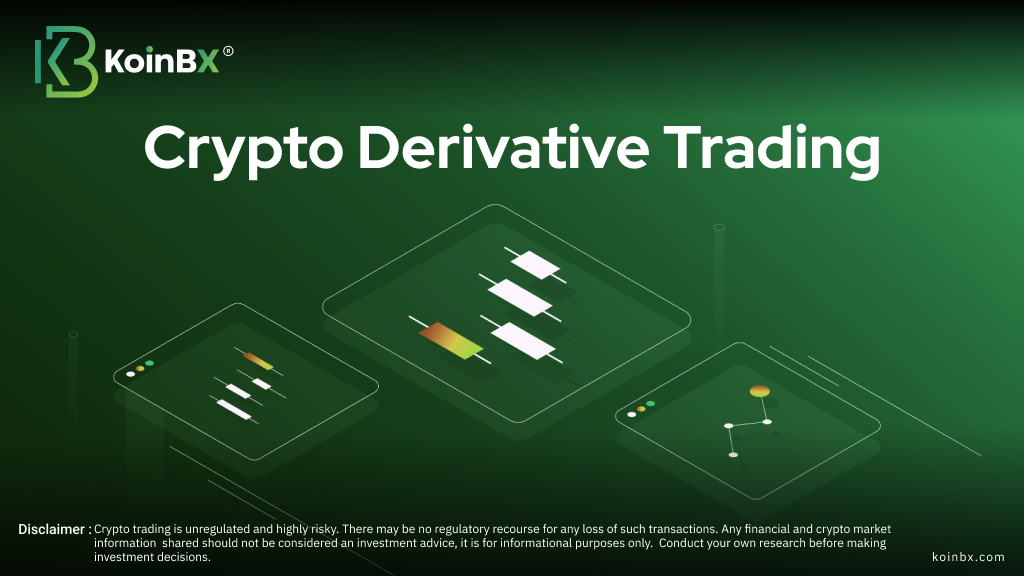Have you ever come across the term crypto derivatives and been curious about their purpose?
As crypto assets gain popularity, derivatives have become a favored method for investors to hedge against risks and make predictions about the value changes in digital assets. However, due to their intricate nature and possible dangers, it's crucial to grasp the details of the crypto derivatives market before making any moves.
But what exactly does this entail, and how can it work for you? In this guide, we'll break down the essentials of crypto derivative trading, explore the different types, provide examples, and talk about the pros and cons, which will help you navigate this exciting market.
What is Crypto Derivative Trading
At its core, crypto derivative trading involves trading contracts that derive their value from an underlying crypto asset, such as Bitcoin or Ethereum, rather than trading the crypto asset itself.
These contracts allow traders to speculate on the future price movements of crypto assets without actually owning them. It's a way to leverage market trends and potentially earn profits whether prices are rising or falling.
In simpler terms, think of it like betting on the outcome of a race. You don’t need to own the racehorse (crypto asset) to place a bet; instead, you’re speculating on where it will finish. If your prediction is correct, you stand to win.
Also Read: What is Scalp Trading in Crypto?
Types of Crypto Derivating Trading
There are several types of crypto derivatives that traders can engage with. Understanding these can help you decide which might be the best fit for your trading strategy.
1. Futures Contracts: A futures contract is an agreement to buy or sell a specific amount of crypto asset at a predetermined price at a specified future date. These contracts are standard in the traditional financial markets and have made their way into the crypto world. They allow traders to hedge against price fluctuations or speculate on future price movements.
2. Options Contracts: An options contract gives the buyer the right, but not the obligation, to buy or sell a crypto asset at a specific price within a certain period. There are two types: call options (which give the right to buy) and put options (which give the right to sell). This type of derivative is often used to minimize risks or maximize profits based on expected market
movements.
3. Perpetual Contracts: Perpetual contracts are similar to futures contracts but without an expiration date. This type of contract is a popular choice in the crypto space. They are often used for long-term speculation, and traders can hold these positions indefinitely, as long as they maintain the necessary margin.
4. Swaps: In crypto trading, swaps are agreements to exchange one set of cash flows for another. The most common are fixed-for-floating swaps, where parties exchange fixed cash flows for floating ones tied to the price of a digital asset.
Crypto Derivatives Trading Examples
Understanding how these contracts work is best illustrated by the examples here.
Bitcoin Futures: Suppose you're confident that Bitcoin's price will rise from $60,000 to $80,000 in the next three months. You could purchase a futures contract that obligates you to buy Bitcoin at $70,000 in three months. If the price does rise as you expect, you can buy at $70,000 and sell at the market price of $80,000, profiting from the difference.
Ethereum Call Option: If you believe Ethereum's price will surge but want to minimize your risk, you could purchase a call option. This gives you the right to buy Ethereum at a set price, say $2,000, within a specified period. If the price exceeds $2,000, you can exercise your option, purchase at the lower price, and sell at the current market price.
Perpetual Contract: You’re bullish on a specific altcoin and decide to enter into a perpetual contract. You buy the contract and hold it as long as the price continues to rise, earning profits from the appreciation.
Also Read: Difference Between Spot and Futures Trading
Pros & Cons of Crypto Derivative Trading
Like any trading strategy, crypto derivative trading comes with its own set of advantages and disadvantages. It's essential to consider these before diving in.
Pros:
1. Potential for High Returns: Due to leverage, crypto derivatives can offer substantial returns on investment. Traders can control large positions with relatively small amounts of capital.
2. Hedging: Derivatives allow you to hedge against market volatility. For instance, if you hold a large amount of Bitcoin and fear a price drop, you could sell a futures contract to mitigate potential losses.
3. Flexibility: With options and other derivative types, traders have the flexibility to adapt their strategies based on market conditions, such as using put options to profit from price declines.
4. Liquidity: Crypto derivatives markets are generally highly liquid, meaning it's easy to enter and exit trades without significant price slippage.
Cons:
1. High Risk: The leverage that can lead to significant profits also increases the potential for substantial losses. Inexperienced traders can quickly find themselves on the wrong side of the market.
2. Complexity: Derivative trading is more complex than straightforward buying and selling of crypto assets. It requires a good understanding of the underlying contracts and market mechanics.
3. Market Manipulation: Derivative markets can be susceptible to manipulation, especially in less regulated environments. This can lead to unexpected price movements that might not reflect the true market sentiment.
4. Regulatory Risks: Depending on your location, there may be regulatory uncertainties surrounding crypto derivatives, which could impact your ability to trade or the legality of your trades.
Final Thoughts
Crypto derivative trading offers an exciting and potentially profitable way to engage with the crypto market. However, it's not without its challenges. By understanding the different types of derivatives, the mechanics of how they work, and the associated risks and rewards, you can make informed decisions that align with your trading goals. If you're looking to hedge your crypto holdings, speculate on price movements, or simply explore new trading strategies, derivatives provide a versatile tool for your crypto trading.
Download KoinBX Android App | Download KoinBX iOS App
Disclaimer: Any financial and crypto market information shared should not be considered investment advice. It is for informational purposes only. Conduct your own research before making investment decisions. Crypto trading is unregulated and highly risky. There may be no regulatory recourse for any loss of such transactions.






Comments